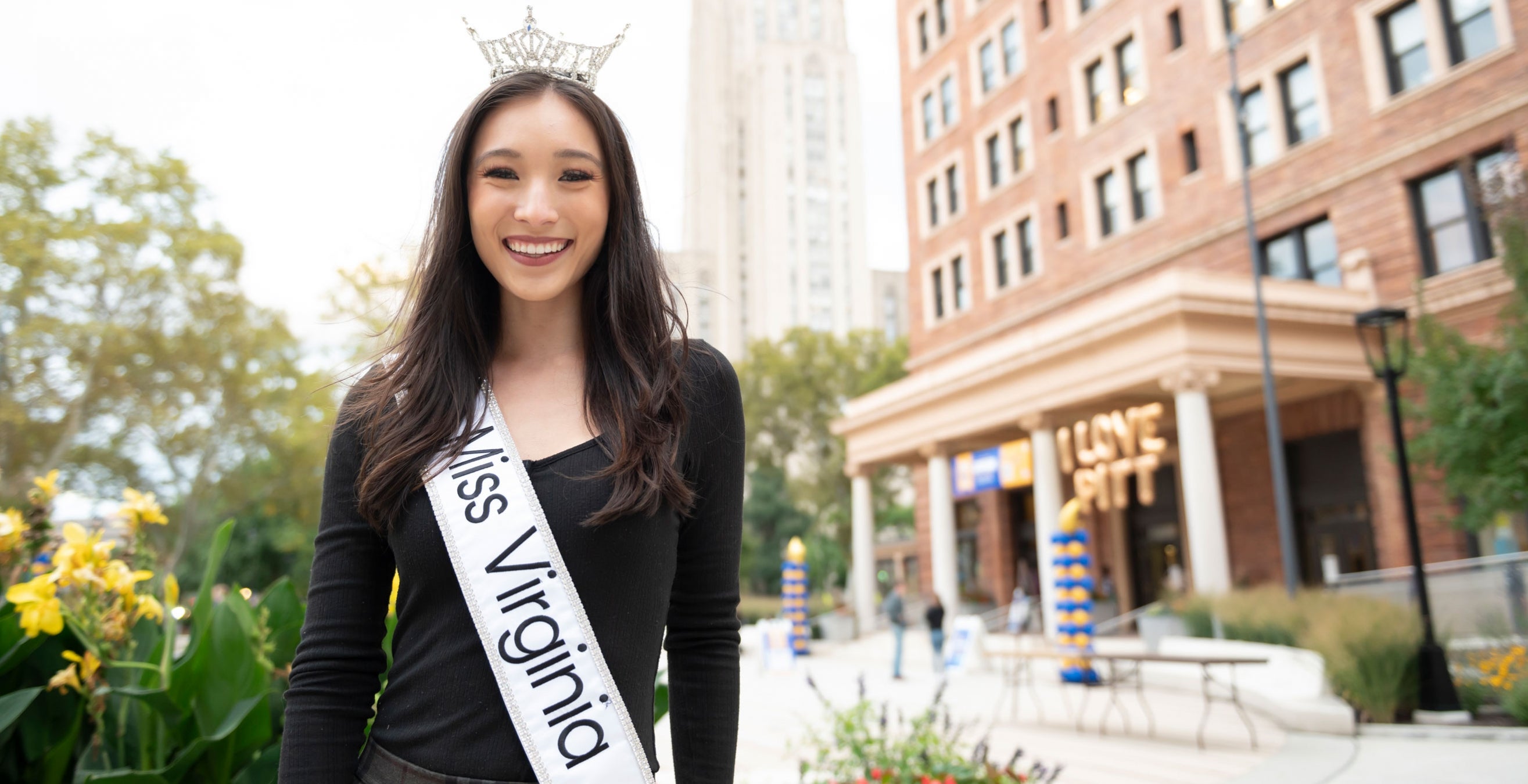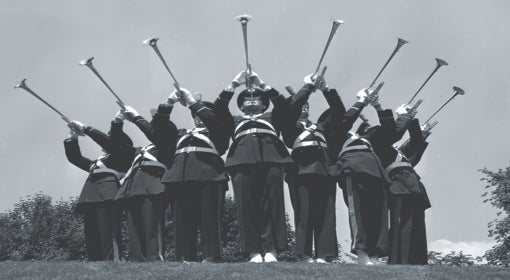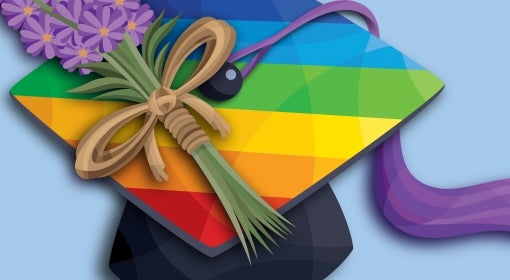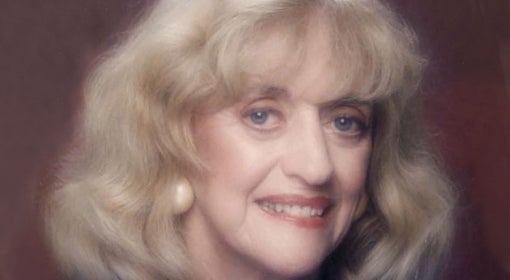When the words were finally spoken—the ones she had worked so long and hard in hopes to hear—Victoria Chuah closed her eyes. For just an instant, she wanted to take the moment in.
She had done it. Just months after earning a master’s degree in computer science from the University of Pittsburgh, Chuah had earned yet another impressive accolade. On stage in front of an audience including her family and friends, she had just been named Miss Virginia 2022—the first woman of Chinese ancestry to hold the title.
When she opened her eyes again, it was to a roar of applause. Wearing an emerald green floor-length gown, she held back tears as she hugged the smiling runner-up and stepped forward to receive a shimmering sash, bouquet of pink roses and, of course, the glittering four-point crown.
“It’s been a dream,” she says of the win, which took place last summer. “I’ve been working for it for so long. It can be overwhelming. But I do it because I love it.”
Competing in pageants isn’t the only thing Chuah loves, and becoming Miss Virginia is far from her only goal. But her journey to the crown and the opportunities it has afforded her—including the chance to compete for the coveted Miss America title—prove to her and young women everywhere that success can take many forms.
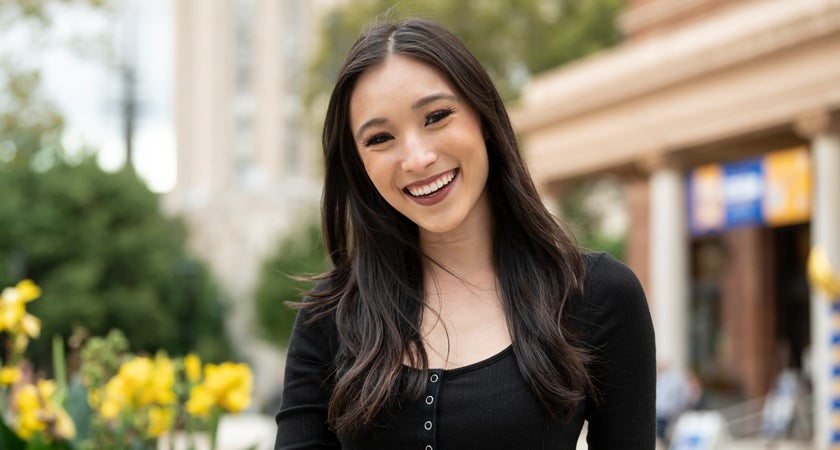
Growing up in Northern Virginia, Chuah didn’t have grand aspirations to join the pageant circuit. But she did have plenty of other ambitions, which is why she always relished the chance to play dress-up. For Halloween, rather than trick or treating as a ghost or a witch, she would stretch her imagination and impersonate whoever she dreamed of being.
One year, she was a fashion designer, measuring tape hanging from her neck. The next, she was an actor, standing out in a sparkling, shiny dress she made herself. Another, she was a film director, complete with black turtleneck, black beret, black lipstick and a painted-on mustache and goatee.
“So many paths to choose,” recalls Chuah, adding that each costume represented an act of reinvention.
It wasn’t until high school that she learned about the pageant path. She had been home recovering from having her wisdom teeth removed when she stumbled upon a social media notice for a local teen competition held as part of the Miss Virginia pageant.
As the honors student read further, she learned that such programs aren’t really about beauty. Rather, the Miss Virginia pageant organization describes itself as a “year-round opportunity for women to earn scholarships, grow their networks, learn valuable life and career skills, and make a difference in their communities…empowering the advocates and leaders of tomorrow.” Winners are chosen based on talent performances and interviews.
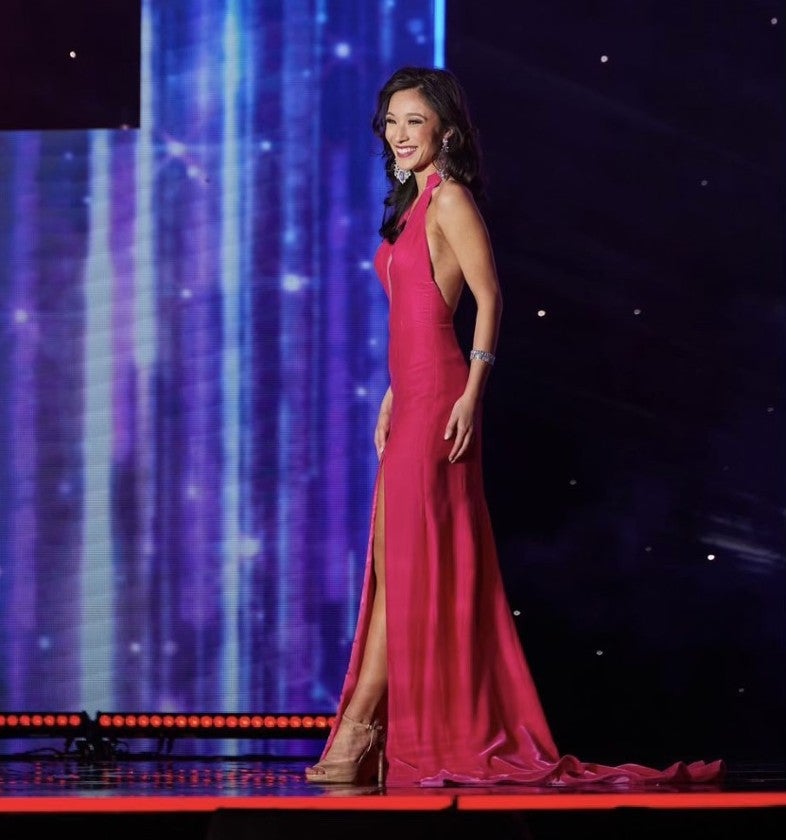 Chuah was intrigued, especially at the prospect of earning a college scholarship. So, with her gums healed, she entered her first competition in 2017 at the age of 16. She was named Miss Virginia/Outstanding Teen second runner-up. She enjoyed the experience—the new challenges it posed and the friends she made—so she decided to keep going. She continued to find success over the next two years, ultimately becoming the second runner-up to Miss Virginia in 2019. After that, she took a pause to focus on her college studies before returning to pageants again in 2021.
Chuah was intrigued, especially at the prospect of earning a college scholarship. So, with her gums healed, she entered her first competition in 2017 at the age of 16. She was named Miss Virginia/Outstanding Teen second runner-up. She enjoyed the experience—the new challenges it posed and the friends she made—so she decided to keep going. She continued to find success over the next two years, ultimately becoming the second runner-up to Miss Virginia in 2019. After that, she took a pause to focus on her college studies before returning to pageants again in 2021.
The young woman intended to get the most out of her time at Pitt, a school that had long been on her radar thanks to her alumna mother, Ann Hebda (A&S ’88). Chuah was drawn to the University’s School of Computing and Information and inspired by Pittsburgh’s burgeoning tech scene, which she believed would offer her an ideal environment to study and grow.
Pitt’s plentiful extracurricular offerings had major appeal, too. When she arrived on campus as a first-year student in 2018, she says she aspired to “do everything.”
Like those Halloween costume days of her younger years, Chuah found so many paths for reinvention—student governance, academic excellence, extracurricular leadership—and she followed them all.
Zach Horton, an associate professor of film and media studies, witnessed Chuah on one of those paths. He had walked into his Vibrant Media Lab, a space on the fourth floor of the Cathedral of Learning where students can work with experimental forms of media and conduct research in material media systems. Hunkered over an embroidery machine was someone Horton didn't recognize. The stranger was Chuah. A friend had told her about the lab, and Chuah came in to start a design project.
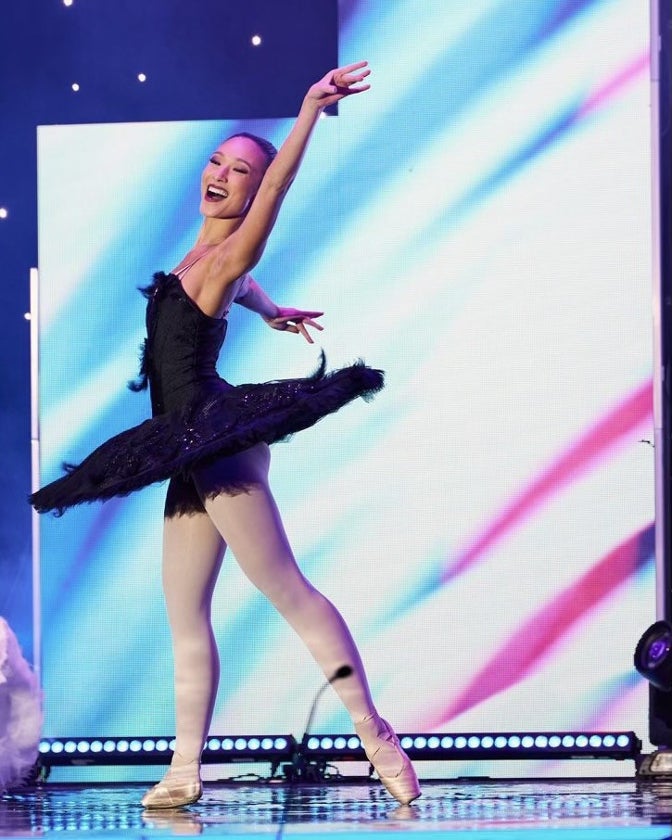 Horton chatted with Chuah and was impressed with her initiative. In a later independent study with Horton, she developed a project that involved sewing electronic sensors into a dress to collect physical data on the wearer.
Horton chatted with Chuah and was impressed with her initiative. In a later independent study with Horton, she developed a project that involved sewing electronic sensors into a dress to collect physical data on the wearer.
At the time, Horton was also developing Supernova, a high-level tabletop game. Chuah collaborated with him—launching a crowdsourcing effort to raise funding, creating an instructional video and designing clothing for one of the game’s characters.
Horton says he found Chuah to be “unstoppable,” with a mode of living that was infectious: “She takes her intellect, her curiosity, her experimentation and creates a virtuous circle. All of what she explores and tries, all of those nodes invigorate each other. It’s like the things she’s creating—they are drawn together and cross-pollinate.”
And her pursuit of those “nodes” would come in handy for her pageant efforts, too.
One of them was ballet, which Chuah began to learn at the age of 2. At Pitt, she joined the University’s Ballet Club and performed the lead role of Clara in a production of “The Nutcracker.” She would call upon that talent in the Miss Virginia and Miss America competitions.
And though at first she found it “terrifying” to audition for the student improv club, Ruckus, she soldiered through and became a member. She ended up becoming the club’s president, using the experience to “break down the fear of the unknown.” She also served as host of Pitt Tonight, the popular student-run late-night talk show, where she sharpened her stage presence and interviewing skills, all of which are key attributes in her pageant competitions.
 Finally, as if those activities and a full course load weren’t enough, Chuah served in undergraduate student government and as president of the graduate student organization for the School of Computing and Information.
Finally, as if those activities and a full course load weren’t enough, Chuah served in undergraduate student government and as president of the graduate student organization for the School of Computing and Information.
In student government, she came to know Eric Macadangdang (A&S ’21), president of the board for the 2020–21 academic year. Most meetings were held over Zoom at that time, and when Macadangdang would log on early to test his video and audio, Chuah was typically there, too.
It was through chatting on Zoom that Macadangdang—now pursuing a master’s degree in public administration at Pitt—bonded with Chuah. He says as they worked together, he saw in her the leadership skills and sensitivity necessary to deal with campuswide challenges that were anything but the norm.
The pandemic forced student leaders to face complex restrictions without a playbook. But even during the most difficult meetings, Macadangdang says Chuah used her wit and humor to help lift the mood among the group. He also admired how Chuah encouraged the student leadership board to speak out about social justice issues. But it wasn’t just talk.
Macadangdang notes that Chuah would prioritize attending campus orientations for first-year students. It was important to her, he says, that students see the diversity of campus leadership: “To see yourself in the student body is empowering. Victoria thought the diversity of the student body should be properly represented. It was a value she carried.”
It's also a value she learned at a price. While she embraces both sides of her ancestry—as the daughter of a mother with Polish ancestry and a father who is Chinese and grew up in Malaysia—she says because of her appearance, she’s dealt with prejudices from being seen as an Asian woman. Yet, having grown up in a multicultural household, she often feels like an outsider in predominantly Chinese communities, too.
That’s why she’s unafraid to bear her soul on the importance of a Chinese American competing on a national platform.
“At Miss Virginia this year, there were princesses,” she says, describing a pageant program for younger participants. “One of them was also half-Chinese and she was so, so touched by seeing me up on that stage. She always wanted to get a picture with me and get a hug after each night, and she was so inspired to continue with the program because she saw someone like her on that stage. That’s just so meaningful. I wish I could have had someone like that when I was growing up; it means so much that I can do that for someone else.”
Chuah says her crown enables her to serve as an example in a number of ways—particularly as a woman in science, technology, engineering and mathematics.
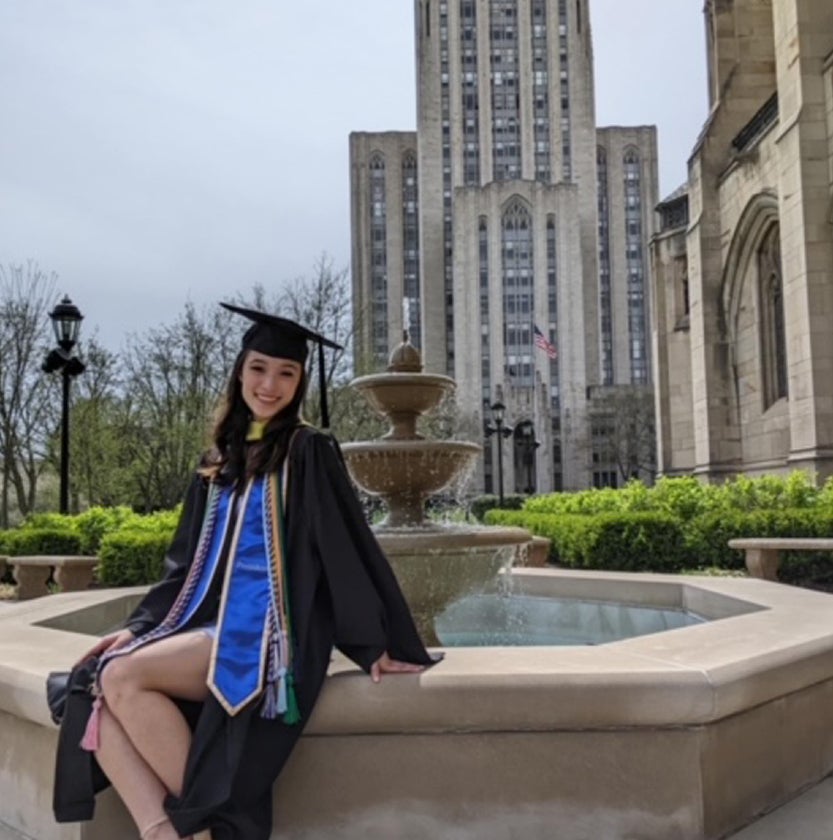 “I was the only woman in my graduating class for my master’s degree,” she says. “I’m inspired to be a representative for young girls who want to enter tech. We use it every day, it’s shaping the future, and women need to be in the room where decisions about tech are being made. We need to push the next generation to be part of those conversations.”
“I was the only woman in my graduating class for my master’s degree,” she says. “I’m inspired to be a representative for young girls who want to enter tech. We use it every day, it’s shaping the future, and women need to be in the room where decisions about tech are being made. We need to push the next generation to be part of those conversations.”
Advocating for others is a key part of her job as Miss Virginia, which has her traveling the commonwealth talking to media, giving presentations at schools, and attending events for nonprofits and community organizations. Her public platform allows her to give voice to an issue close to her heart: awareness and advocacy for adults with autism.
Her younger brother, Luke, is on the autism spectrum. When they were growing up, she says, “I was aware he was different, and I had to grow to understand why.” As she did, she began to discern more of her brother’s challenges and how her family worked to navigate them.
“He’s 19, so he is now an adult. I’ve seen the lack of resources for adults with autism. There are programs that need to exist and don’t.” She aims to use her crown to help make a difference.
“Miss Virginia gets a lot of attention,” she says, “and I want to be able to use it while I have it.” By speaking to the public through events and media, Chuah’s goal is to bring attention to the lack of services for those living with autism after they age out of school. When that happens, she said, many face obstacles in finding jobs, volunteering, or becoming fuller members of society.
Since becoming Miss Virginia, she’s taken on several new roles related to her favorite causes, including sitting on the advisory board of Home Life Community, which provides community homes for people on the autism spectrum, and serving as a spokesperson for SourceAmerica, a group that pairs adults with disabilities with job opportunities. Plus, the governor invited her to join Virginia's STEM Education Advisory Board. They are honors she says she’s happy to juggle alongside her official duties. After all, she’s pretty familiar with keeping many balls in the air at once.
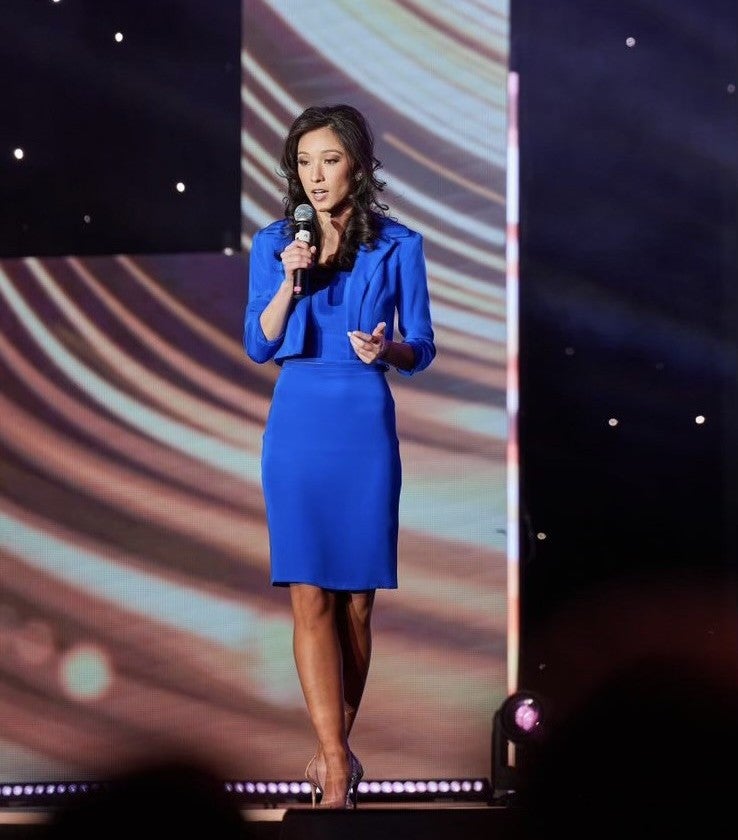 In December, Chuah traveled to Connecticut to compete in the Miss America pageant. While she didn’t ultimately win the top crown, she was named the winner of the $10,000 Miss America Foundation’s Women in S.T.E.M Scholarship—a testament to her advocacy efforts and ambitions in the field.
In December, Chuah traveled to Connecticut to compete in the Miss America pageant. While she didn’t ultimately win the top crown, she was named the winner of the $10,000 Miss America Foundation’s Women in S.T.E.M Scholarship—a testament to her advocacy efforts and ambitions in the field.
Even as the excitement of the December event recedes and she prepares to pass her crown on to the next Miss Virginia this summer, she won’t be slowing down any time soon. She already has a job waiting for her as a software engineer with Morgan Stanley, the financial services company she interned with while at Pitt. And there’s a host of other hobbies, causes and challenges she’s eager to tackle next.
“I don’t ever want to have a regret,” she says. “I don’t ever want to have the thought of, ‘Oh, well, I missed the time to have had that. Or I wasn’t able to do this, and I wish I had done more.’”
So, with a full heart—and a full calendar—Chuah is poised to make a difference, one crowning achievement at a time.
This story was published on December 19, 2022. It is part of Pitt Magazine's Winter 2023 issue.

